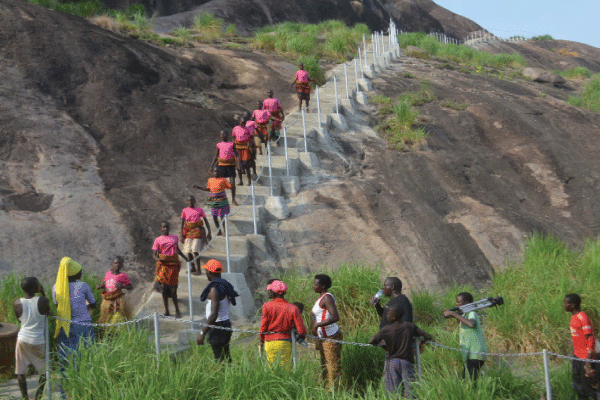Kadaga warns on reemerging border trade barriers

Left to right: East African Affairs minister Rebecca Kadaga, CEO of Kilimo Trust Birungi Korutaro, and CEO of Upland Rice Millers Philip Idro at the exhibition of the EA rice project in Kampala on Wednesday. PHOTO / FRANK BAGUMA
What you need to know:
- She raised the concern during the closing ceremony of the Competitive African Rice Initiative –East Africa (CARI –EA) project organised by the Alliance for a Green Revolution in Africa (AGRA) in collaboration with Kilimo Trust and the East African Secretariat in Kampala on Wednesday.
The Minister for East African Affairs, Ms Rebecca Kadaga, has asked regional member states to quell the reemerging trade barriers that continue to hurt trade.
“Last week, we received reports about the new trade barrier at the South Sudan border where each cargo truck is charged $60 (about Shs230,000) to cross. We are addressing that, but the challenge is, as we address existing barriers, new ones emerge,” Ms Kadaga, who is also the First Deputy Premier, said.
She raised the concern during the closing ceremony of the Competitive African Rice Initiative –East Africa (CARI –EA) project organised by the Alliance for a Green Revolution in Africa (AGRA) in collaboration with Kilimo Trust and the East African Secretariat in Kampala on Wednesday.
The three-year CARI-EA project (April 2019 - May 2022) commissioned by the United States Agency for International Development through AGRA strategy for inclusive agricultural transformation in Africa, was implemented in Uganda, Kenya and Tanzania.
It aimed at enabling locally produced rice in East Africa to competitively substitute the current more than $300 million worth of rice imports to the Common East African Market.
Ms Kadaga said the EAC would continue addressing such challenges to ensure that no member states suffer at the hands of those that treasure such barriers.
“There were quite a number of trade barriers but we worked very hard to eliminate most of them and we shall continue doing the same because we don’t want any country to become a slave of the other in the economy, ” she said. On the issue of the impact of climate change on agriculture, Ms Kadaga tasked the Ministry of Agriculture to promote use of irrigation schemes to boost productivity.
She also advised farmers to use the existing arable land to produce a variety of crops, including wheat whose importation has been disrupted by the war in Ukraine.
The chief executive officer of Kilimo Trust, Dr Birungi Korutaro, said the $3.13m (Shs11.9b) project has benefited more than 200,000 small holder farmers.
A total of 22 processors were supported by the project in all the three countries with more than $6.3 million that was leveraged from the private and public sector investments.
The chief executive officer for Upland Rice Millers Ltd, Mr Philip Idro, said Africans have a duty to stabilise productivity, quality of rice to avoid spending $7.2b on rice imports.
“There should be a lot of efforts by farmers, researchers and governments in terms of interventions, considering that Africa imports $7.2b of rice. That is the market we need for our farmers,” Mr Idro said.
The Permanent Secretary in the Ministry of Agriculture, Maj Gen David Kyomukama, said they will work with Kilimo Trust in the next five years to boost rice productivity in Uganda.
Mr Stephen Bwantware, the commissioner for crop production in the Ministry of Agriculture, who represented Maj Gen Kyomukama, said the government had embarked on constructing irrigation schemes, including Doho II Irrigation Scheme in Butaleja District and Wadilai irrigation scheme in Pakwach.
challenges
Although the Common Market Protocol calls for accelerated economic development and fostering social ties of regional citizens, intra-regional trade still faces several challenges. These include persistent trade disputes, inadequate value addition to the agricultural sector, non tariff barriers, and a restrictive trade regime.




